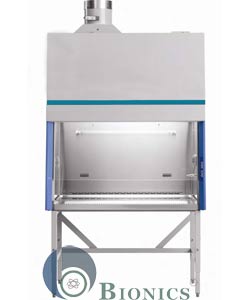The Growing Craze About the Biosafety Cabinets
The Growing Craze About the Biosafety Cabinets
Blog Article
Class 2 Biosafety Cabinets – Vital for Lab Safety and Biological Containment

In today’s scientific and clinical labs, safety for personnel and samples is non-negotiable. Whether it's conducting biological tests, diagnostics, or experiments with infectious agents, biosafety cabinets form the backbone of contamination control.
Of all types, Class 2 cabinets are most commonly used due to their efficiency and versatility. These units are crucial for working with moderate-risk organisms and sensitive samples.
Overview of Biosafety Cabinets in Laboratory Environments
Biosafety cabinets are airflow-controlled workspaces engineered for microbiological safety. They use HEPA filtration to remove contaminants from incoming and outgoing air.
These units are generally classified into three categories—Class I, Class II, and Class III. Among these, Class II units strike a balance between user, product, and environmental protection.
What Are Class 2 Biosafety Cabinets?
Class 2 Biosafety Cabinets ensure safety on all fronts—personnel, workspace, and biological material. They generate a vertical airflow that reduces turbulence and contamination.
Both incoming and outgoing air are HEPA-filtered to maintain sterility and prevent leaks. These cabinets are ideal for work involving moderate-risk pathogens (BSL-2/3).
Essential Features of Class 2 Safety Cabinets
A Class 2 microbiological safety cabinet includes several advanced features such as:
• Medical-grade filters for capturing contaminants
• Steady air movement to reduce airborne particle circulation
• Pressure differentials that maintain internal containment
• Optional UV lights for overnight sterilisation
• Low sound emissions to reduce fatigue
• Front glass for full control and protection
These elements ensure safety, comfort, and efficiency in day-to-day lab tasks.
Industries and Labs That Rely on Microbiological Safety Cabinets
Class 2 Biosafety Cabinets are key equipment in healthcare, molecular biology, and quality control. They are ideal for safe handling of samples during testing and experimentation.
From universities to private pathology labs, Class 2 cabinets ensure lab hygiene and sample integrity.
Why Laboratories Prefer Class II Safety Cabinets
Using Class 2 cabinets offers significant improvements in contamination control and user safety:
• Reduces the risk of sample cross-contamination and error
• Prevents accidental exposure to infectious materials
• Improves environmental safety by filtering outgoing air
These Class 2 Biosafety Cabinets cabinets combine safety features with operational efficiency.
Cabinet Types and Global Compliance
Top manufacturers ensure their cabinets meet certifications like NSF 49, EN 12469, and WHO recommendations. Class 2 units are sub-classified as A1, A2, B1, and B2—based on varying airflow balance and ducting needs.
• Type A2: Most commonly used cabinet model
• Type B2: Suited for labs dealing with toxic agents
Matching the cabinet type to your process is essential.
How to Select a Class 2 Safety Cabinet
Before purchasing, consider:
• The biosafety level required (BSL-1, BSL-2, or BSL-3)
• Available lab space and utility infrastructure
• Energy consumption and maintenance frequency
• Warranty, training, and certification services
Partnering with a trusted provider helps meet both performance and safety needs.
Best Practices for Using Class II Biosafety Cabinets
For optimal results:
• Install the cabinet in a draft-free, low-traffic zone
• Schedule regular performance checks
• Ensure operators follow best practices
Operational best practices include:
• Use gloves, gowns, and face shields while operating
• Work calmly to prevent airflow disturbances
• Wipe work areas with disinfectants regularly
• Treat UV usage as an overnight sterilisation method
Why Class 2 Cabinets Are a Must-Have in Labs
Class 2 biosafety cabinets are a cornerstone of any safe, efficient laboratory. They ensure contamination-free experiments and personnel safety.
From clinical research to vaccine development, Class II cabinets maintain sterility in sensitive procedures. When investing in a biosafety cabinet, choose performance and reliability over cost-cutting—because safe science starts with smart containment. Report this page